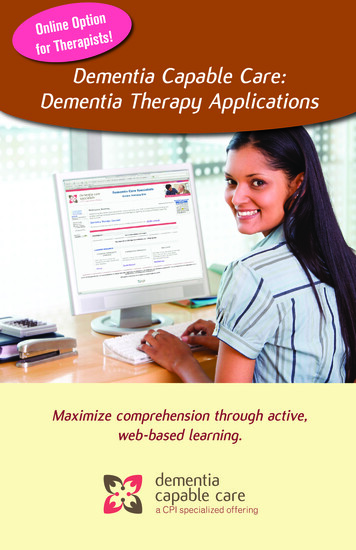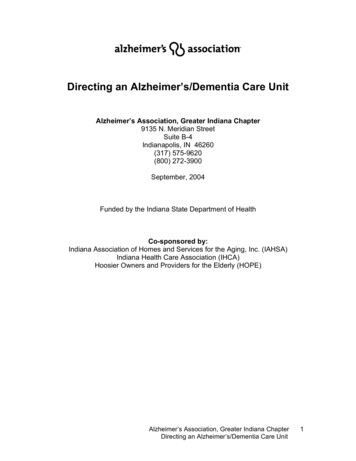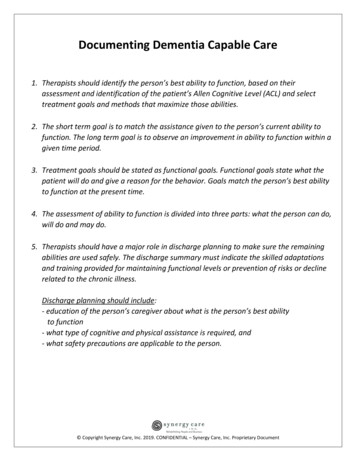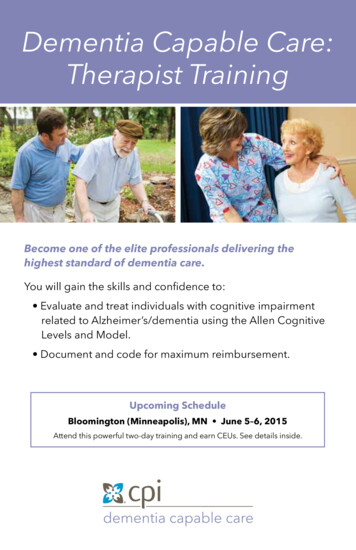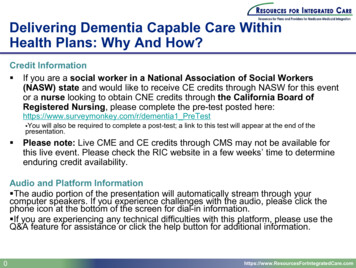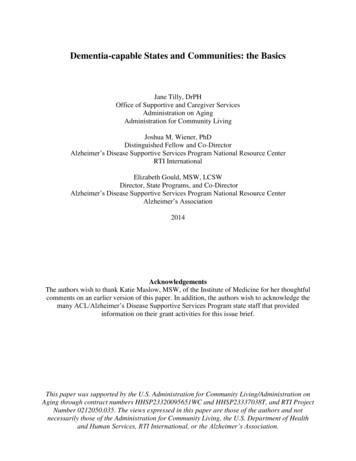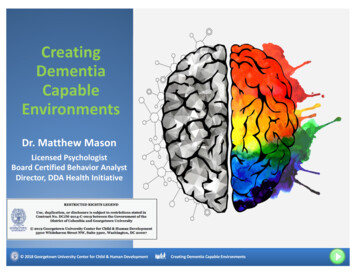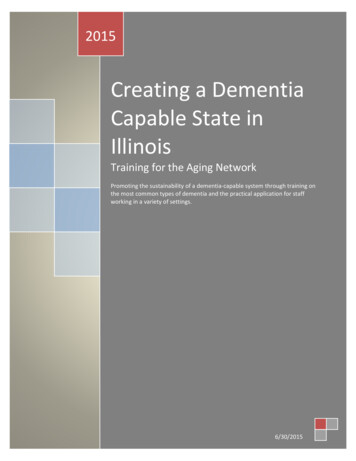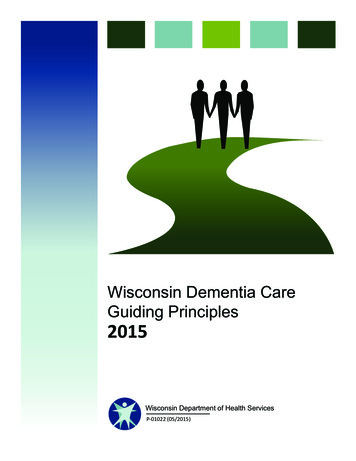
Transcription
Wisconsin Dementia CareGuiding Principles2015Wisconsin Department of Health ServicesP-01022 (05/2015)
Dementia Care Guiding PrinciplesTable of ContentsIntroduction . 2Purpose of Guiding Principles . 4What the Dementia Care Guiding Principles mean to you: . 4Dementia Care Guiding Principles . 5Guiding Principle #1 – Personal Liberties. 6Guiding Principle #2 – Community Awareness . 9Guiding Principle #3 – Early Detection and Diagnosis . 13Guiding Principle #4 – Independence and Choice . 19Guiding Principle #5 – Individualized Care and Services . 24Guiding Principle #6 – Meaningful Activities. 28Guiding Principle #7 – Coordinated Systems . 33Guiding Principle #8 – Education and Training . 35Guiding Principle #9 – Communication through Behaviors . 38Guiding Principle #10 – Environment and Living Space . 42Appendix-Definitions . 451
Dementia Care Guiding PrinciplesIntroductionIn October of 2013, the Wisconsin Department of Health Services (WI DHS) convened aDementia Care Stakeholder Summit to launch a redesign of Wisconsin’s dementia care system.Summit participants identified top priorities, which were then used to guide the developmentof the DHS “Dementia Care System Redesign Plan.”The plan was finalized in February of 2014 and included the important step of developingdementia care standards, now referred to as “guiding principles,” for Wisconsin. The followingstrategies were used to design quality, comprehensive dementia care guiding principles: Existing guidelines, resources and best practices were thoroughly researched to establisha foundation for Wisconsin’s development of dementia care guiding principles. Sourcesincluded the National Institute on Aging (NIA), the Alzheimer’s Association, academicresearch studies, health provider associations, consumer and advocacy organizations, theState of Wisconsin and other states. In addition, international resources were examined,including the comprehensive United Kingdom Dementia Quality Standards and ScotlandStandards of Care for Dementia. Both the United Kingdom and Scotland are leaders in thedevelopment of dementia standards including guidance statements, practices, qualitymeasures and outcomes. Input from partners throughout the dementia care network was collected to providedirection and focus areas as an initial step for the development of guiding principles.Three stakeholder work groups were established by DHS to provide feedback and insight onwhat was important to include and emphasize in the guiding principles. The threeworkgroups consisted of experts in: 1) crisis intervention; 2) service provision; and 3)dementia programs. These experts participated in a three-hour discussion held in May of2014. Workgroup participants from all three groups offered their experiences, expertise andinsights. Each workgroup provided important and informative input that was essential inthe development of the Wisconsin Dementia Care Guiding Principles. The draft Guiding Principles was shared with dementia care partners to solicit commentsand feedback. In September of 2014, the draft was shared with stakeholders through aweb-based survey. The survey link also allowed stakeholders the opportunity to providefeedback. The responses were analyzed and considered in creating the final GuidingPrinciples document.2
Dementia Care Guiding PrinciplesThe Wisconsin Dementia Care Guiding Principles describe the values and practices necessary toprovide high-quality, effective care and support for all people living with dementia. Each personliving with dementia should have accessto the highest quality of life possibleconsistent with the person’s need for careand with the least restrictions placed onhis or her personal liberty. This includescare options that are individualized, highquality, and well-coordinated regardlessof setting, and present the least intrusionin a person’s life.The Wisconsin Dementia Care GuidingPrinciples also include a strong emphasison prevention or mitigation of crisissituations that may arise, and anemphasis on consumer awareness, person-centered care, and community engagement. TheGuiding Principles are for all people in Wisconsin living with dementia, their families, theircaregivers, health care providers, medical personnel, first responders and all communitymembers who serve and interact with people living with dementia.The Wisconsin Dementia Care Guiding Principles are not regulatory in nature. In somespecifically-defined situations and settings, there may be other governing provisions thatregulate applicable programs and services.The Guiding Principles also do not replace the manyexisting high-quality programs, practices and toolsalready available. Instead, the Wisconsin DementiaCare Guiding Principles supplement these resourcesand initiatives and provide common terminology andan understanding of the values that are shared by allstakeholders.While numerous examples and resources related todementia care are available, those included withinthis document have been selected with the followingobjectives in mind: they illustrate the particularguiding principle they accompany, they can bereplicated in Wisconsin, they provide helpfulguidance, tools and templates that can be utilized bya broad base of users and they offer hope andinspiration.3
Dementia Care Guiding PrinciplesPurpose of Guiding PrinciplesThe Wisconsin Dementia Care Guiding Principles represent the fundamental values associatedwith a high quality, dementia-capable system of care for people living with dementia. TheGuiding Principles create a foundation for professional practice and guidance for those livingwith or caring for a person living with dementia.Establishing dementia care guiding principles is essential to people living with dementia, theirfamilies and their community, healthcare and social service providers and staff, and otherorganizations and stakeholders. The Guiding Principles provide a common language to assureconsistency across the State of Wisconsin, and enhance the understanding of rights,responsibilities and available supports necessary for a dementia-capable Wisconsin. All of theGuiding Principles are equally important and are not intended to stand alone. They have beendeveloped to serve as an integrated whole with the collective purpose of facilitating adementia-capable Wisconsin.What the Dementia Care Guiding Principles mean to you:If you are a person living with or caring for someone with dementia:The Wisconsin Dementia Care Guiding Principles are based on your rights. They exist to assureyou receive the care and support you need.If you are a care provider:The Wisconsin Dementia Care Guiding Principles can assist you in orienting and training yourstaff and designing new programming to maintain and improve the quality of your services.If you are a first responder:The Wisconsin Dementia Care Guiding Principles provide a link to critical resources that canhelp assure you have the skills, knowledge and confidence to interact in the most supportiveway with people living with dementia.If you are a member of the community:The Wisconsin Dementia Care Guiding Principles provide resources to help you to become moreaware of people living with dementia in your community and provide information on ways youmay be able to connect with and support them.After each guiding principle in this document, there is a list of resource references that providesadditional information to assist you.4
Dementia Care Guiding PrinciplesDementia Care Guiding PrinciplesGuiding Principle #1-Personal Liberties: People with dementia deserve thehighest quality of life possible with the least restrictions placed on theirpersonal liberties.Guiding Principle #2-Community Awareness: Dementia-related education,guidance and resources for community members should be easily accessible.Guiding Principle #3-Early Detection and Diagnosis: All individuals deserve tohave access to early screening for dementia, followed by an accurateassessment, diagnosis and prompt referral for services.Guiding Principle #4-Independence and Choice: People living with dementiadeserve to have the highest degree of independence and choice possible.Guiding Principle #5-Individualized Care and Services: People living withdementia deserve to receive care and services designed around their uniquepreferences, culture and values.Guiding Principle #6-Meaningful Activities: People living with dementiadeserve to have opportunities to engage in meaningful activities.Guiding Principle #7-Coordinated Systems: Caregivers and health careprofessionals should work as a team to provide effective care for people livingwith dementia.Guiding Principle #8-Education and Training: People caring for individualsliving with dementia should have the knowledge, skills and abilities to provideeffective support.Guiding Principle #9-Communication through Behaviors: Caregivers shouldview behaviors as a form of communication and strive to identify the causeand solutions.Guiding Principle #10-Environment and Living Space: The living space forpeople with dementia should provide safety and the comforts of home.5
Dementia Care Guiding PrinciplesPersonal LibertiesGuiding Principle #1 – Personal LibertiesPeople living with dementia deserve the highest quality of life possible with theleast restrictions placed on their personal liberties.The focus of this Guiding Principle is onpeople living with dementia and thebalance needed for them to achieve thehighest quality of life with the leastrestrictions placed on their personalliberties. The balance is in ensuring safetyand appropriate care while responding tothe person’s changing abilities to makechoices and decisions. This Principle is theoverarching goal of the WisconsinDementia Care System Redesign and eachof the Guiding Principles in this document.People living with dementia have unique health and emotional challenges. They need specialsupport to continue to live a fulfilling life with the most freedom and independence possible astheir health situation evolves.Rather than focus on decline and loss, it is essential for those supporting individuals living withdementia to recognize and emphasize current abilities. In addition, people living with dementianeed the maximum involvement possible in developing a plan of care that meets theirindividual needs. This is a critical step in developing a plan of support that will help the personliving with dementia maintain abilities for as long as possible while compensating for challengesin day-to-day living. Also it is important to include the person living with dementia in currentand future legal and financial decisions as well as in establishing advance planning directives.This will help to assure that his/her wishes and preferences, value as a person, and his/herexperiences and relationships are not overlooked or diminished.In order to achieve the highest quality of life with the least restrictions, people living withdementia need to: Be regarded as unique individuals and be treated with dignity and respect.Participate in care and treatment decisions, including decisions about the use of medicationand about medical procedures.Receive care that maximizes independence, inclusion and individualism.Receive culturally competent care that includes linguistically appropriate communicationaccess, respect, opportunity to pursue one’s religious or spiritual beliefs, and practices, andopportunity to maintain lifestyle choices.Be free from abuse, neglect, self-abuse/neglect and financial exploitation.6
Dementia Care Guiding Principles Personal LibertiesFreely participate, without undueinfluence, in political activity andvoting (unless constrained by statuteor judicial order).Be able to refuse medication andtreatments (unless constrained bystatute or judicial order).Participate in legal, financial andadvance planning.EXAMPLES AND BEST PRACTICESAlzheimer’s Association Legal RightsThe Alzheimer’s Association offers useful online information on legal rights, as well as key legalforms and documents to assist people living with dementia and their families in asking the rightquestions about medical, financial and legal decisions and taking essential steps to assure thatall rights are respected and protected.Legal information can help to ensure that the rights of every person living with dementia arehonored and that his or her wishes are respected even as changes in health make it necessaryfor others to make decisions on his or her behalf. Information can be foundat: ments custom/statements/right to treatment.pdfEden Alternative The Eden Alternative is a non-profit organization dedicated to creating quality of life forelders and their care partners. The Eden Alternative asserts that care is a collaborativepartnership. All caregivers and care receivers are considered care partners, each an activeparticipant in the balance of giving and receiving. Focused on changing the culture of care, thisapproach to person-directed care initially started in nursing homes. It has since expanded itsreach to all care settings. Additional detailed information is available at:http://www.edenalt.org/International ExamplesAlzheimer’s Society England, Wales and Northern Ireland - Equality, discrimination andhuman rightsThe Alzheimer’s Society is a membership organization that works to improve the quality of lifeof people living with dementia in England, Wales and Northern Ireland. The Society has adetailed website that includes beneficial information regarding people living with dementiarelated to equality, discrimination and human rights. This information can be found at thefollowing documents info.php?documentID 16747
Dementia Care Guiding PrinciplesPersonal LibertiesScotland’s Charter of Rights for People with Dementia and Their Carers in ScotlandIn Scotland, the Cross Party Group in the Scottish Parliament on Alzheimer’s has created the“Charter of Rights for People with Dementia and Their Carers in Scotland.” The Cross PartyGroup recognized that, in addition to the impact of dealing with a dementia diagnosis, peopleliving with dementia and their caregivers often face cultural, social and economic barriers to fullrecognition of their rights. The Cross Party Group believed a Charter of Rights was necessary to: Ensure that those who provide health and social care and other services understand andrespect the rights of people living with dementia and their caregivers.Empower people living with dementia and their caregivers to assert their rights in their dailylives.Ensure the highest quality of service provision to people living with dementia and theircaregivers.The “Charter of Rights for People with Dementia and their Carers in Scotland” reflects thestandards already set by the United Nations and other international instruments by recognizingand supporting the rights of people living with dementia and those who care for them.The Charter of Rights website can be found at: OURCE REFERENCES1. Dementia Standards of Care Scotland, I have the right to be regarded as a unique individualand be treated with dignity and respect (pages 88/0117212.pdf2. Dementia: Supporting people living with dementia and their caregivers in health and ons/misc/dementia/dementia-fullguideline.pdf3. Legal -dementia-legal-documents.asp4. Palliative and End-of-Life dementia-overview#content viewnode%3Anodes-palliative-and-end-of-life-care5. Right to Treatmenthttp://www.alz.org/documents custom/statements/right to treatment.pdf8
Dementia Care Guiding PrinciplesCommunity AwarenessGuiding Principle #2 – Community AwarenessDementia-related education, guidance and resources for community membersshould be easily accessible.This guiding principle ensures thatcommunities have access to resources tounderstand dementia and its impact.It is estimated that one in nine peopleover the age of 65 has a form ofdementia. Seventy percent of people withdementia are living in their homes, in thecommunity, and not in care facilities. Theygo about their lives using public services,patronizing businesses and attendingsocial events as they have always done.Encountering someone with dementia in day-to-day life is not uncommon, yet few people seemto know much about dementia or how to be a friend to someone with dementia.A lack of understanding about dementia has led to stigmatization of the condition. As a result,individuals are often reluctant to talk about their own concerns or concerns for a loved one,which contributes to increased levels of fear about the disease (e.g. fear of the unknown, fearof being judged negatively and fear of being told there is nothing that can be done to preserveabilities, social inclusion and respect). The remedy to the fear and isolation created by stigma iseducation, both at the community and individual levels.Many community members, businesses, organizations and other groups interact with andprovide service to people living with dementia. These members and groups can play anessential role in the quality of life of a person living with dementia and his or her caregivers.When the community understands dementia and its impacts, it can lead to greater respect forthe needs and rights of people living with dementia and can reduce stigma while creatingopportunities for people living with dementia to successfully engage in community activities.There are many options already available for training and education. Increasing communityawareness of dementia should be an important focus for all Wisconsin communities.EXAMPLES AND BEST PRACTICESThe Fox Valley Memory ProjectThe Fox Valley Memory Project collaborates with other organizations to offer programs andservices that improve the quality of life for people living with dementia, as well as their family,care partners, and friends. The Memory Project encourages practices of hospitality andinclusion that make the community dementia-friendly. The Memory Project’s vision for living9
Dementia Care Guiding PrinciplesCommunity Awarenesswell with dementia includes Memory Cafés, a Memory Loss Resource Center, WorkplaceEnrichment, Long-Term Care Outreach, Community Education, a Memory Assessment Centerand Dementia Research. The Memory Project also supports area businesses and organizationsin providing dementia-friendly service. Additional information can be found #sthash.40UdLCz2.dpufJefferson County, Wisconsin Dementia Care NetworkThe Dementia Care Network of Jefferson County, Wisconsin is a network of individuals andorganizations who
dementia-capable Wisconsin. What the Dementia Care Guiding Principles mean to you: If you are a person living with or caring for someone with dementia: The Wisconsin Dementia Care Guiding Principles are based on your rights. They exist to assure yo
